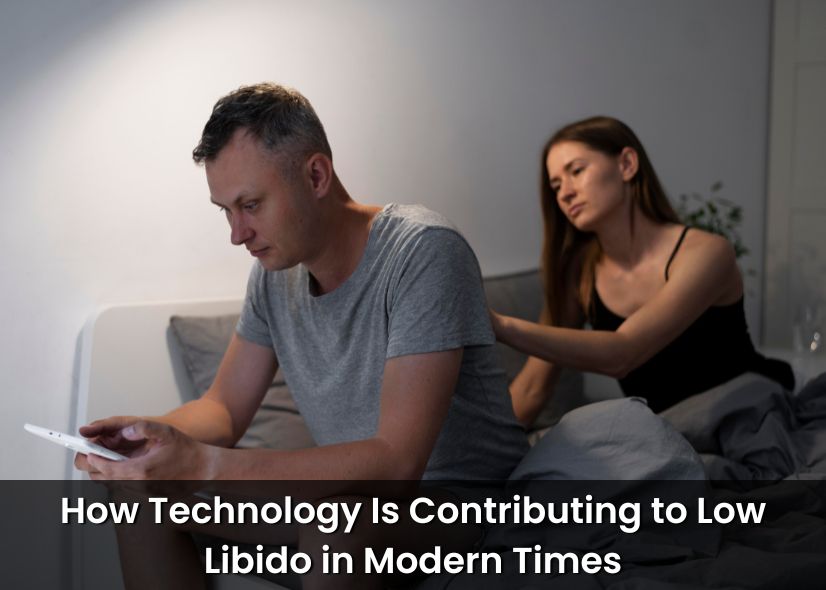Today’s world is changing so quickly that technology has completely changed almost every element of our existence. From communication to work, leisure, and entertainment, we are more connected and reliant on technology than ever before. However, the widespread integration of technology into daily life comes with a downside. One surprising consequence that many people overlook is its impact on human health, particularly sexual health. At Lal Clinic, we’ve observed an increasing number of individuals experiencing low libido, and many factors linked to modern technology are playing a role. This article will explore how technology is contributing to low libido in modern times and what can be done to address this growing issue.
1. The Role of Sedentary Lifestyles and Screen Time
One of the most significant contributors to low libido in today’s world is the sedentary lifestyle that modern technology often encourages. As people spend more time on their phones, computers, and in front of televisions, physical activity levels have plummeted. Sitting for long periods can lead to weight gain, reduced fitness, and poor cardiovascular health—all of which are major contributors to a decline in libido.
Physical activity plays a crucial role in sexual health. It helps maintain proper blood circulation, which is vital for sexual arousal and function. A lack of exercise can result in decreased energy levels, increased stress, and hormonal imbalances, all of which can lower one’s desire for sex.
2. How Social Media Affects Body Image and Self-Esteem
The rise of social media has significantly changed how people perceive themselves and their bodies. Platforms like Instagram, Facebook, and TikTok constantly bombard users with images of “ideal” bodies and lifestyles, often creating unrealistic standards. This can lead to poor self-esteem and body image issues, which are directly linked to sexual desire.
When individuals feel insecure about their appearance, they may feel less confident in intimate settings. Low self-esteem can lead to performance anxiety, making it difficult to relax and enjoy sexual experiences. Over time, this can contribute to a reduced libido.
At Lal Clinic, we emphasize the importance of self-acceptance and body positivity. It’s crucial to recognize that the “perfect” body presented on social media is often curated and unrealistic. Feeling comfortable in your own skin can greatly improve your sexual health and overall well-being.
3. Stress and Anxiety from the Always-Connected Lifestyle
Technology has created a 24/7 connected world where people are constantly accessible through emails, texts, and social media notifications. This “always-on” lifestyle often leads to increased stress and anxiety, as people feel pressured to be constantly available and productive. It is well known that anxiety and chronic stress reduce libido.
High levels of stress trigger the release of cortisol, a hormone that can interfere with the production of sex hormones such as testosterone and estrogen. Additionally, stress can make it difficult to relax and feel present in intimate moments, which can diminish sexual desire over time.
To mitigate these effects, it’s essential to set boundaries with technology. Taking regular breaks from screens, establishing “no-phone zones,” and practicing mindfulness techniques can help reduce stress and improve sexual health.
4. The Sleep-Deprivation Epidemic
Another major factor contributing to low libido is the effect technology has on sleep. Devices like smartphones, tablets, and computers emit blue light, which can disrupt the body’s natural sleep-wake cycle. Excessive exposure to blue light, especially before bedtime, reduces melatonin production, making it harder to fall asleep and get a full night’s rest.
Sleep deprivation has a direct impact on libido. When individuals don’t get enough sleep, their energy levels plummet, and their bodies produce less of the sex hormones that drive libido. Studies have shown that even one night of poor sleep can lower testosterone levels in men and disrupt hormone regulation in women.
At Lal Clinic, we recommend limiting screen time before bed and creating a technology-free bedtime routine to improve sleep quality. Good sleep is a critical component of maintaining a healthy libido.
5. Pornography and Unrealistic Sexual Expectations
The accessibility of pornography through the internet has grown exponentially in recent years. While consuming pornography is not inherently harmful, excessive consumption can create unrealistic expectations about sex and intimacy, potentially contributing to issues in real-life sexual relationships.
Frequent exposure to pornography can lead to desensitization, meaning individuals may require more extreme stimuli to feel aroused. This can result in a decrease in sexual satisfaction with a partner, leading to performance anxiety, emotional disconnection, and ultimately, a reduction in libido.
At Lal Clinic, we encourage individuals to be mindful of how their consumption of pornography may be affecting their relationships and sexual health. Open communication with a partner about sexual needs and desires can help build intimacy and improve libido.
6. Technology-Induced Distractedness
The constant distractions from technology—be it smartphones, streaming services, or social media notifications—can detract from quality time spent with partners. People are more likely to multitask or focus on their devices rather than engaging in meaningful connections. This can lead to a decrease in emotional intimacy, which is a key component of sexual desire.
Increased reliance on technology for entertainment also leaves less time for fostering physical closeness and romantic moments. Over time, this distance can erode sexual chemistry, contributing to low libido.
Setting aside dedicated, tech-free time to connect with a partner can help restore intimacy and rekindle sexual desire.
Conclusion
While technology has undeniably enhanced many aspects of our lives, it has also introduced new challenges for sexual health, including a rise in low libido. From sedentary lifestyles and unrealistic body expectations to stress, sleep deprivation, and pornography consumption, technology is impacting our sexual well-being in multiple ways. At Lal Clinic, we understand the importance of addressing these challenges and offering solutions to help individuals regain a healthy libido.

